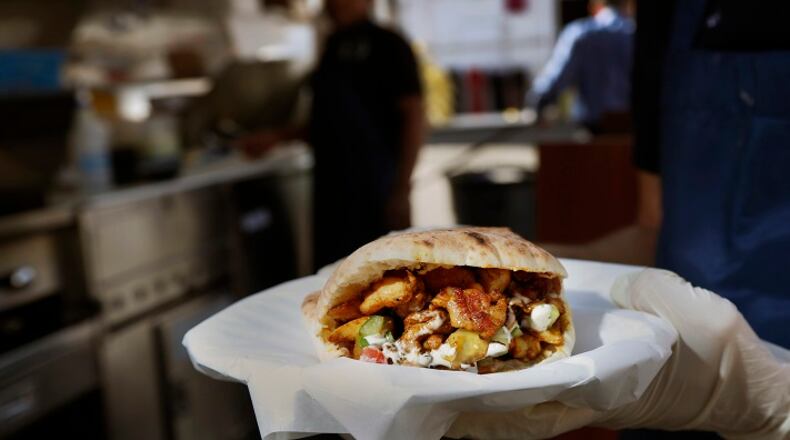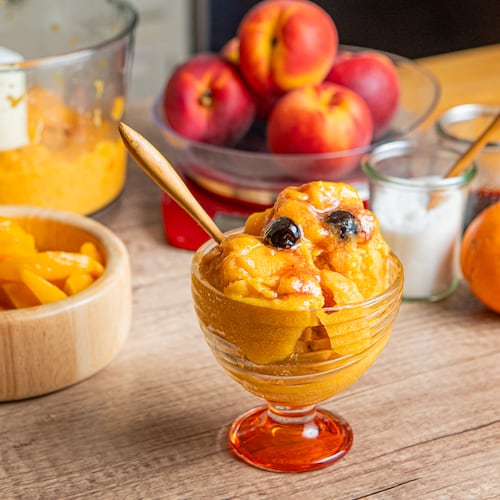LOS ANGELES — If you’ve walked through the streets of Jerusalem, as some of us have, holding warm laffa bread wrapped around shawarma — the entire sandwich laced with chile sauce — then one meal at the Holy Grill in Los Angeles can bring you straight back to Israel.
The Holy Grill is a certified Glatt Kosher food truck located in a parking lot on 15th Street, in the middle of the downtown L.A. garment district. It’s relatively easy to find a Kosher food truck in Los Angeles, but a Glatt Kosher truck, which involves stricter requirements for meat, not so much.
The truck specializes in common dishes found in Israel, including shakshuka, a traditional Israeli breakfast dish made with spicy, garlicky tomato sauce and two eggs — cracked right into the sauce — cooked until just past over easy. During the lunch rush on a recent Friday, men in suits with their sleeves rolled up, ties thrown over a shoulder, used their hands and strips of pita bread to eat the shakshuka.
“Some of the recipes are from my parents, amazing cooks who specialize in Israeli-Moroccan cuisine,” said co-owner Adiel Nahmias, who moved from Israel to the U.S. in 2008. “Most of the recipes are mine. It is a place where I can experiment and let my creativity grow and it was a great opportunity to feel the energy from back home.”
Nahmias, who bought the truck (the name Holy Grill was inherited) in 2013 with his partner, Dvir Botach, tries to keep the dishes as close to what you’ll find at a restaurant or stand in Israel as possible. Some of the spices are imported from Israel, along with the pita bread — which happens to have a nice chew and be thicker and fluffier than most. The truck’s laffa bread, not the thick bubbly kind you may find at the Israeli restaurant Hummus Bar and Grill in Tarzana, is more of a lavash and comes from a bakery in the San Fernando Valley called Super Pita.
There’s shawarma, pieces of chicken heavily spiced with cumin and garlic, served with grilled onions; round beef and lamb kebab patties studded with cilantro (similar to a Lebanese kafta); and pargiot, a marinated chicken dish made with green onion, paprika, cilantro and a few of Nahmias’ other secret spices.
The hummus, which comes with almost everything on the truck, is creamier and more subtle than some of the grainier versions served at Lebanese restaurants. And you can eat it straight, with a spoon.
You can also order bourikas, pastries filled variously with apples, meat and potatoes, or Nahmias can make you a bourikas sandwich: The thin, flaky dough is cut in half lengthwise, then stuffed with slices of hard-boiled egg and tomato. Just add hot sauce and some garlic mayo, a thin, house-made sauce that tastes a bit like a creamy Italian dressing.
In a small seating area next to the truck, there are squeeze bottles of the dressing conveniently placed every two feet or so on top of a table, covered in a vinyl tablecloth decorated with pictures of produce and bottles of soda. Most of the people eating lunch are putting the dressing on anything and everything.
Next to the bottles of garlic mayo are a stack of white kippahs (brimless caps used to cover a person’s head during prayer) and blessings and prayers written in Hebrew on laminated pieces of paper, available to those who wish to say a blessing before a meal.
“But my goal is to achieve customers of all types of backgrounds,” Nahmias said.
You may still be thinking about that trip to Israel while you check out the prayers and eat your shawarma sandwich, but the fight over a parking meter across the street will bring you right back to Los Angeles.
About the Author
The Latest
Featured


